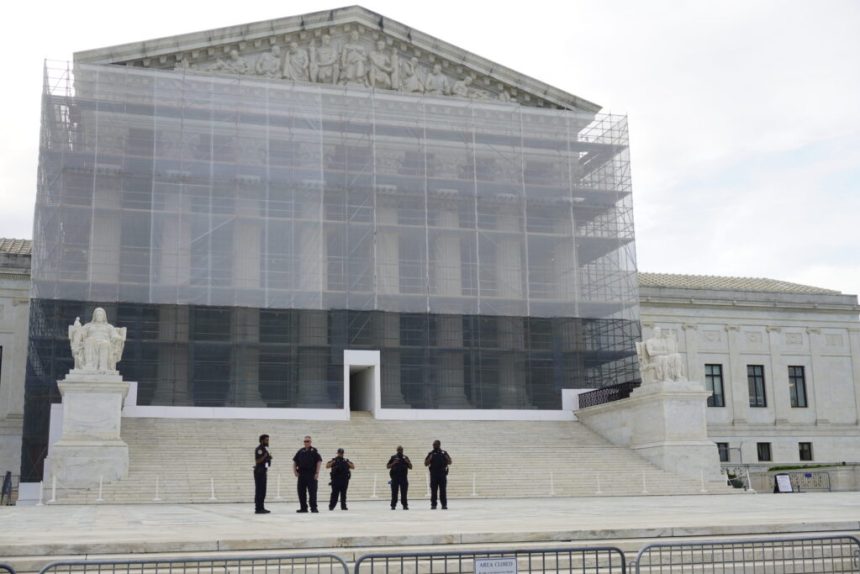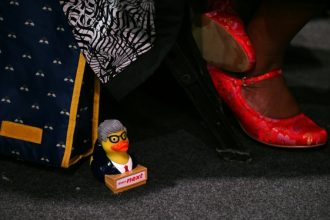The facade of the U.S. Supreme Court in April, when it was covered with scaffolding for construction. (Photo by William J. Ford/Maryland Matters)
Maryland joined 22 other jurisdictions urging the U.S. Supreme Court to take up, and reverse, a ruling that would prohibit individuals from challenging election laws and redistricting issues under the Voting Right Act.
The states’ brief, filed Monday, said the 8th U.S. Circuit Court of Appeals finding that only state and local governments can file challenges under Section 2 of the Voting Rights Act of 1965 takes away an essential tool in protecting voting rights. Section 2 prohibits racial discrimination in voting laws and policies.
The brief said about 91% of all Section 2 challenges from 1982 to 2024 came from private plaintiffs, and only about 7.5% were from attorneys general. The 2-1 ruling by a panel of 8th Circuit judges in May “is an outlier and wrong,” the states said, noting that the 8th Circuit is the only federal circuit to prohibit challenges to voting policies by private citizens.
The case, Turtle Mountain Band of Chippewa Indians v. Howe, stemmed from a lawsuit filed by tribes and individual voters against North Dakota Secretary of State Michael Howe, claiming that a state redistricting plan diluted the voting power of Native Americans, in violation of Section 2.
The Supreme Court this summer — at the urging of the attorneys general and others — put the 8th Circuit ruling on hold while the tribes and voters appealed the case to the Supreme Court.
SUBSCRIBE: GET THE MORNING HEADLINES DELIVERED TO YOUR INBOX
Maryland Attorney General Anthony Brown said that Section 2 of the Voting Rights Act is one of the “nation’s most important safeguards against racial discrimination in voting, and private enforcement has been central to its success for more than half a century.”
“The Eighth Circuit’s departure from decades of practice comes at exactly the wrong time – when federal enforcement has diminished and when millions of voters need protection heading into upcoming elections,” Brown said in prepared statement on the brief.
It comes a week before the court is scheduled to hold a second hearing on Louisiana v. Callais, which asks whether Louisiana violated the 14th or 15th Amendments — guaranteeing equal protection and voting rights — when it drew two majority-Black congressional districts in an attempt to comply with Section 2.
Former U.S. Attorney Eric Holder, speaking at last month’s Congressional Black Caucus Foundation conference in Washington, D.C., said the Supreme Court upheld Section 2 when it ruled Allen v. Milligan in 2023 that the state of Alabama’s new congressional map likely discriminated against Black voters.
“How are you now going to say that two years later something has happened and you’re now going to find Section 2 unconstitutional?” Holder asked. “Having said that, I worry about what the court is going to do, so we’ll have to see.”
Besides Maryland and the District of Columbia, other states on the brief were Arizona, California, Colorado, Connecticut, Delaware, Hawaii, Illinois, Maine, Massachusetts, Michigan, Minnesota, Nevada, New Jersey, New Mexico, New York, North Carolina, Oregon, Rhode Island, Vermont, Washington and Wisconsin.









